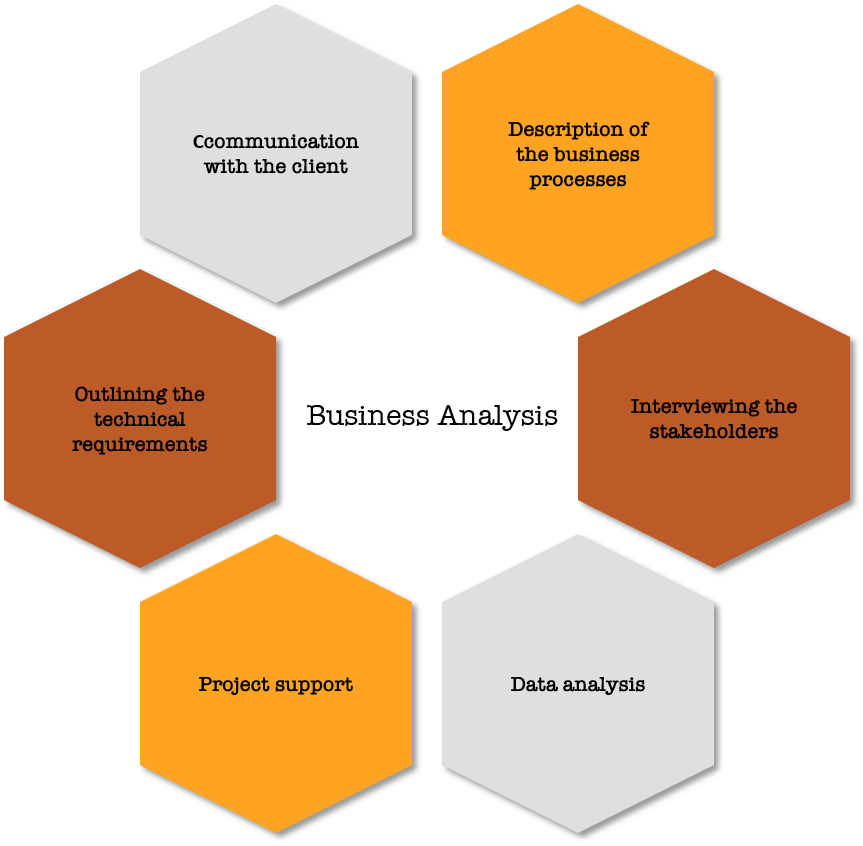A business analyst is a person who acts in a project as a kind of translator from business language to technical and vice versa. This is his/her ability to understand business needs and translate them into a technical aspect for their implementation. If at first glance it may seem to you that this role is not as important as, for example, the role of a developer, then you are mistaken. Let’s find out why.
What Is the Role of a Business Analyst for Web Development?
Simply put, thanks to a business analyst on the team, everyone understands the strategic goals and scope of work, identifies a clear connection between business needs and technical requirements, separates the key aspects from the secondary ones, follows the plan in stages and deadlines, and builds effective communication with the client.
Unless you assign a dedicated business analyst, the development team will take much longer to define the technical requirements before they start implementing the functionality. Thus, the business analyst is beneficial to both parties in terms of budget and other resource savings. For the development team, issues related to the business side in the process of creating a product are resolved. The client's team always understands which technologies and features will cover the required functionality, why such a choice was made, and how it will live in production. So the role of a business analyst for developing a website, software, or app is enormous.
At the same time, a good business analyst has a wide range of knowledge and skills. Of course, he/she knows the basics of programming and testing and has a good understanding of the software life cycle. A business analyst knows how to work with large information systems and designs functional architecture, describes business processes, owns various methods of collecting and analyzing information, and also knows how to create high-level documentation.
So, these are the main tasks of a business analyst in website development or building applications.

1. Definition of goals, the scope of work, and expected results
To do this, he/she works closely with stakeholders, identifies the client's needs, and analyzes in detail the problem that the client wants to solve. He/she draws up and analyzes the requirements for a future product, studies the market and its problems, and monitors competitors and their solutions, identifying problem areas with which to work. An analyst also defines the criteria by which the development will be considered successful.
2. Formation of business requirements in the form of technical specifications for developers
A business analyst creates and validates a concept for a future product, selects the approaches that will be used to solve business problems, and divides requirements into categories, detailing them. He/she gives an estimate of labor costs and duration of work. In addition, in the process of work, his/her tasks include the management of requirements and changes in them.
3. Explaining technical solutions to clients
Here is just about the role of a business analyst as a translator. It is a business analyst who explains the technical nuances to a customer in simple language, justifies solutions, and explains how possible changes will affect the final result of the project.
4. Creation of documentation
Here we are talking about detailed specifications with user stories and more generally about creating a development plan or roadmap with fixed technologies, development stages, and timeframes. We can also include the creation and support of any other project documentation.
5. Organization and support of communication between teams
A business analyst builds an open and trusting relationship with a client, clarifies any questions, discusses new ideas, and so on. In our practice, clients can directly communicate with any member of the project team, not limited to only the manager or BA. But under different circumstances and approaches to work, the role of BA in communication is very important.
6. Project support
Once the website or application has been developed and released to production, a business analyst assesses the level of achievement of business goals, collects feedback from stakeholders, and, if necessary, draws up a roadmap for future improvements (a business analyst in enhancing a website or app applies many different techniques). These are main business analyst responsibilities in website enhancement or application maintaining.
The Benefits a Business Analyst Gives to a Project
One of the main and most obvious benefits is efficiency gains. Most of the pre-project work a business analyst does will mitigate many of the risks associated with the development process. A detailed analysis at the start allows for not only determining what the product should be, but also how to optimize resources, think over possible difficulties, and fill gaps in requirements.
In addition, it is often the BA who is capable of generating unexpected ideas and offering interesting non-obvious solutions. In cooperation with the developers, a BA can significantly enhance the project.
At the same time, a business analyst at website development is able to prioritize and highlight key features based on business knowledge and logic. This can be very important in conditions of limited resources.
Read about how to build your own travel website.
How It Works at Gearheart
Our project teams always have a dedicated business analyst for website development, apps, and software development. This allows us to work with complex custom projects in completely different areas of business. And we believe that this is very important because, having studied and understood the intricacies of our clients' businesses, we can create really cool, demanded, and working projects, relying on strong technologies. You can read about the composition of the teams and the cases we have implemented here.
Final Thoughts
A business analyst is an important member of the outsourced development team. This person combines the functions of an analyst, a translator, a coach, an architect, a referee, and a facilitator. We hope we have clarified the role of a business analyst in website development
or building applications. At the same time, we are always happy to tell in more detail about a BA or other experts of our team, as well as show the results of their work. This way, you can easily contact us.




